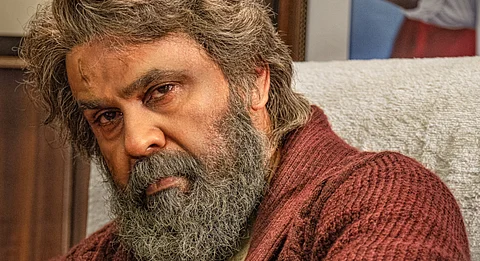Thankamani Movie Review: Exhaustive, exploitative take on a real tragedy
Thankamani Movie Review: Exhaustive, exploitative take on a real tragedy(1.5 / 5)
Thankamani, Ratheesh Reghunandan's sophomore film, draws many parallels with his first, Udal (2022). Both could be interpreted as home invasion thrillers. In his latest, which is inspired by the infamous 1986 Thankamani incident, the home is the village and the invaders, the cops.The similarities don't end there. The protagonists in both of these flicks thirst for vengeance. Thankamani's Abel Joshua Mathew (played by Dileep), like Udal's Kuttychan (Indrans), seeks to take revenge for the atrocities inflicted on their dear ones. Unlike his impressive debut, Ratheesh falters with how he treats Thankamani. In his hands, it is just another star-led revenge tale. In its yearning to document the gruesomeness of the 1986 incident, the film also turns quite exploitative.
Director: Ratheesh Reghunandan
Cast: Dileep, Neeta Pillai, Pranitha Subhash, Manoj K Jayan
In the film, years after the tragic incident, Abel is on a mission to kill the perpetrators of the crime—a local businessman, a politician, and a couple of high-ranking policemen. Remember the actor's 2006-released film, Chess? Though 18 years have passed since, the makers of Thankamani follow a similar revenge-drama template, which doesn't suit today's evolved sensibilities. While Dileep had Ashish Vidyarthi as a formidable opponent in the 2006 film, the investigator's role in Thankamani is played by Pranitha Subhash—one of the many miscasts in the film. Her character, Arpita, is sketched as the typical no-nonsense cop who isn't bothered about her superiors. However, there's nothing brainy about her as the character's scope is largely limited to singing paeans on Abel and his daredevilry. The flashback portions are narrated to her in fragments by a clutch of people. Though the camera focuses on her on each of these occasions, likely in the hope of registering a feeling of shock or distress, the actor fails to make anything of it. Sometimes, she is even unintentionally funny.
It is not just Pranitha; Thankamani has several actors who are absolutely clueless on screen. The funny wigs, which seem to have been distributed generously, right from the principal cast to the junior artists, only make things worse.
The political uproar that followed the real Thankamani incident had inadvertently also dishonoured the whole village, especially its women. This is one of the few issues that the film effectively addresses. Siddique's ever-dependable narration also ensures that these portions are handled sensitively. But the same can't be said about how the makers depict violence. The various degrees of torture inflicted upon the villagers are shown extensively, including in closeups, making it extremely discomforting for viewers.
Similarly, we see the revenge-hungry Abel employing various tools like axes, cutter machines, metal spikes, and hammers to torment victims. It is strange that cinematographer Manoj Pillai didn't shy away from capturing such graphic visuals in close quarters. If the intention was to ensure the audience feels the agony, there are better ways to convey it than just resorting to trauma porn.
It also seems like Manoj Pillai is aping Tamil cinema aesthetics in the film as we see cameras flying around and zooming in and out of moving vehicles like in Lokesh Kanagaraj's films. The climax fight also has his signature mocobot shots. But the visuals lack finesse, thanks to poor lighting and shoddy production design. From the mud roads that lead to Thankamani village to the many shops and houses that litter the place, nothing looks original in the film.
Thankamani is not an easy film to sit through, not because of all the violence and bloodbath but rather for its deafening music. It's as if composer William Francis, realising the poor writing and performance, has taken it upon himself to hammer in loud, infuriating music to ensure that the viewers feel the 'pain'. What's supposed to be a tale of a bleeding village ends up bleeding the ears.

